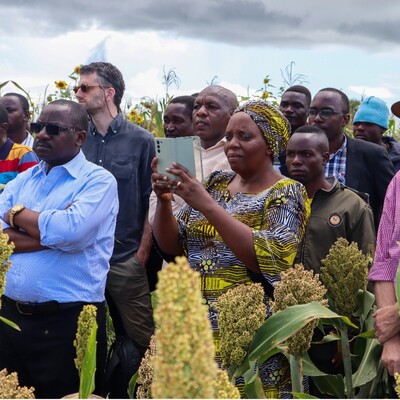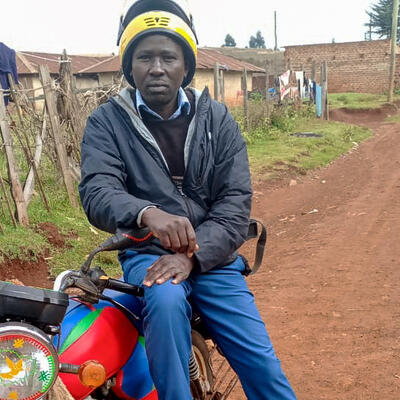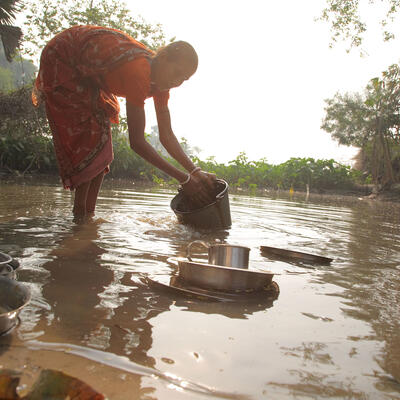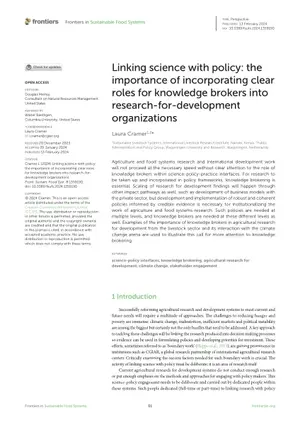
Jimmy Smith receives honorary doctorate from the University of Melbourne
Jimmy Smith, director general of the International Livestock Research Institute (ILRI), received a doctorate with honoris causa and gave the commencement speech at the University of Melbourne, Australia, on 6 Dec 2018. The speech, called an Occasional Address in Australia, and delivered before the graduates in the law and agricultural sciences programs, brought together several important strands in Smith’s thinking over the years: The value of education as a way of transcending class and racial boundaries, the importance of development-oriented agricultural research, and the need to combat the narrow forces of prejudice and nationalism.
Lindsay Falvay, ILRI’s Board chair and a professor at the University of Melbourne, said that the conferral of the honorary doctorate is a recognition of Smith’s exemplary leadership of ILRI and of the major global contributions ILRI continues to make to international agricultural research.
Following is the speech as drafted to the graduates today. See his speech as delivered here (starting from around 41 mins).

Jimmy Smith, director general of ILRI at the Africa Livestock Conference and Exhibition held in Nairobi 26-28 June 2013 (photo credit: ILRI/Raphael Njoroge).
‘Chancellor, Allan J. Myers AC QC, vice chancellor professor Duncan Maskell–thank you for the warm introduction,
dean, members of the faculty and the university council,
graduands, families and friends,
Ladies and gentlemen:
Thank you for the recognition and tremendous honour you have bestowed on me today.
That this has come from one of the finest Agricultural Faculties in the world—and indeed, from one of the finest universities in the world, makes me and my wife Charmaine (sitting in the audience) feel extremely proud and privileged.
Graduands, it is said that ‘life is measured in moments not minutes’ and your conferment will be one of those moments—one of those times in your life that you will remember years and decades from now. I am delighted to be a part of it.
This marks an enormous achievement for all of you and soon, if not already, you will be giving careful thought to what next! I am hopeful that you will be considering your role as citizens–not only as Australians, or of your respective national origins –but also your role as ‘citizens of the world’ and the rich opportunities before you there.
We understand—we cannot help but understand—whether we like it or not, that we all are citizens of a globalized world. And that means at least two things for well-educated citizens like you—I add well-educated, because the privilege of a fine university education brings with it responsibilities to apply your talents, not only for the benefit of yourselves but also for the benefit of others.
First, a citizen of the world acknowledges that the world is made up of far more than any one nation, any one perspective, any single tribe or creed or color or orientation or ideology.
I make this patently obvious point because it seems that there is a sort of nationalistic fervor sweeping the world and with it, the torching of the ‘global village’ ideal and a return to attitudes and prejudices, that I thought we had long overcome.
Second, it means that as interconnected citizens—we must act on it.
The great religious and moral traditions of the world have long insisted that humanity is linked.
An Australian aboriginal saying reminds us that for all our differences we share basic values, feelings, rights and hopes: ‘We are all visitors to this time, this place. We are just passing through. Our purpose here is to observe, to learn, to grow, to love… and then we return home.’
These sayings and many more, from cultures and religions the world over, recognize in the most emphatic way that humanity is of one kind.
But here’s the difference. In the past, that used to be a moral precept, an ideal, an aspiration. Today the idea that we are all interconnected is not just metaphorically true. It is literally true.
The challenges we face—the challenges that will dominate your future—are interconnected—international in their very nature: Climate change, global pandemics, hunger, poverty, refugee and immigrant flows, trade and economic development.
These problems aren’t going away. And if we are going to solve them, then we will have to embrace, not retreat from them (as many seem to be doing these days). We must work together as a global whole, across boundaries of race, religion, gender, economies and nations. It’s not romanticism to say that the world is a global village. It’s the simple truth—one that we neglect at our peril.
You have heard and seen something of my background already. To explain what drives my attitude to this subject that I have broached with you, I must tell you a little more about me. I come from a poor nation (Guyana) where I was born to parents of limited means and who phenotypically span the color spectrum. My birth was well before Guyana gained its independence and in those days society was strictly ordered along colour and class structures. Given the Mendelian results of phenotypes of seven boys in the family, I was not eligible to emerge on the national much less the international stage —yet here I am because my parents saw to it that I got a good education. Perhaps you have had your own difficult path or a much easier one—but don’t take your education for granted.
When I graduated, my instincts and curiosity led me to explore development-oriented agricultural work. From positions in the national agricultural systems of Guyana and the Caribbean, to the Canadian International Development Agency to the World Bank and to the International Livestock Research Institute (ILRI), where I now serve as its director general. Every journey into it took me deeper and deeper into this world, along with an increasing conviction that a global perspective and global action is imperative.
My current institute, ILRI, conducts livestock research ‘with the end in mind’—addressing through high-level science those very global challenges I mentioned earlier– climate change, global pandemics, hunger, poverty, refugee and immigrant flows, economic development. We collaborate with major researchers around the world, including with faculty at this university. Our work at ILRI aims to make a difference in the lives of around one billion people who in one way or another rely on livestock—something I’m sure rings true in this nation that understands the roles of animal and animal products. We like to summarise our mission as ‘better lives through livestock.’
I have found that joining up livestock agriculture with international development challenges and opportunities, through great research, is one of the most exciting things you can do, and a great way to contribute to some of the world’s biggest challenges and opportunities. For those of you graduating with law degrees, don’t be lulled into thinking that this is only about the aggies. Today’s agriculture challenges and opportunities include negotiating complex trade and intellectual property arrangements, as well as international treaties and protocols for plant and animal genetic resources, among others.
I felt compelled to give you that background because it brings together two strands of the case I am trying to make—the immense value of the education you have received and the case for playing a role as global citizens.
But there is a third stand of my narrative that makes me especially pleased to be here in Australia, a country that has produced so many of the world’s great agricultural scientists: People like Derek Tribe (who helped create ILRI’s predecessor), John Vercoe (a former Board chair of ILRI), and John Dillon (distinguished agricultural economist) all of whom made immense contributions to the world of global agricultural development and to ILRI in particular—and many of them to me personally.
And I must mention two more who are important to both our institutions at this time:
- Professor John Lindsay Falvey, your former dean, who is the chairman of the Board at ILRI;
- and the Nobel-prize winning immunologist Professor Peter Doherty, ILRI’s patron and past Board member, who is also on the faculty here at the University of Melbourne.
A quick scan of LinkedIn finds that at least 13 graduates or professors of the University of Melbourne have worked for ILRI in the past.
But you don’t have to travel overseas to make a difference (although I hope some of you will—and even come to ILRI). You can contribute from home. For all its problems, globalization also presents a unique set of opportunities that have the potential to contribute to economic growth, poverty alleviation, food security and overall increases in welfare more so now that at any time in human history. You can decide to be part of that!
The point is this: You have received a great education here at the University of Melbourne, and the world is your oyster. You can focus on making money, or becoming a politician, scientist, farmer, teacher or anything you wish. But in addition to the superb technical and scientific skills you have honed here at Melbourne, I hope your education and the examples of Australians who have gone before you, have given you something else: A perspective, an understanding that I hope you will take with you throughout your life, wherever you may go and whatever you may end up doing. And that perspective is simply this: For all our real or perceived differences, we are in this together—all of us.
















